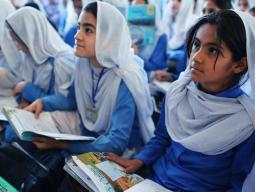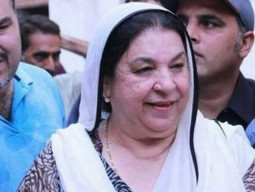
ISLAMABAD: Australia's assistance to women in Pakistan through health and agriculture-related projects would greatly contribute to reduction in maternal and child mortality rate and ensure women's economic empowerment, visiting Australian Ambassador for Women and Girls Dr Sharman Stone said on Tuesday.
Dr Stone, a former member of Australian parliament, is currently on a three-day visit to Islamabad where she launched the $6 million project 'Saving Lives of Women and Girls in Cross Border Area in Pakistan' and also the gender-based strategy for the Australian Centre for International Agricultural Research (ACIAR) in Pakistan.
"By helping women stay healthy, we help them participate equally in society, education and economy," Dr Stone told the media in an exclusive interview following the launch of health and agriculture-related projects for women in Pakistan.
Dera Bugti women suffer due to absence of gynecologist
Dr Stone who has a 20-year experience in politics, termed education the key to human development for both boys and girls.
"Whether in Australia or Pakistan, children need access to enrolment at schools, good curriculum, well-trained teachers, besides toilets and change facilities particularly for girls so they do not miss school on puberty," she said.
She lauded Pakistan's initiatives including legislation on increasing marriageable age up to 18 years and making 10 per cent participation of women voters mandatory for validation of election.
She mentioned that Australia was one of a few countries in the world with compulsory voting in polls and imposed fine over non-participation.
On challenges for both Pakistani and Australian women to enter and remain in politics, Dr Stone said even today, Australian women did not enjoy parity and had only 27 per cent representation in the parliament.
She said reserved seats for women in Pakistan's parliament was a significant step towards gender equity.
Ambassador Stone stressed the need to develop an atmosphere of respect among both men and women to eliminate gender-based violence, and said "there is no magic solution or silver bullet for complex issues, but a correct gender-specific approach".
Elimination of gender bias is important because it could destroy a women's health and could leave her with economic, physical or psychological scars, she pointed.
She said Australia was helping Pakistan to establish a Male Champions of Change chapter to step up besides women to promote gender equality.
She mentioned that it would bring together Pakistani male business leaders who can lead by example to promote inclusive workplaces and women in leadership on issues including sexual harassment, pay gap and flexible hours.
Higher education: Barriers to women education discussed
On media's role, Dr Stone said it could be extremely powerful in changing attitudes of society and emphasized that cases of rape and child abuse needed an emphatic understanding while reporting instead of giving salacious details and blaming of victims.
Also, Australia and Pakistan Tuesday signed a Memorandum of Understanding for collaboration on water, food and energy security.
Australian High Commissioner to Pakistan Margaret Adamson and Secretary for Water Resources Shamail Khawaja inked the MoU at the margins of the Indus Knowledge Forum, a workshop organised by the Australian and Pakistani Governments.
High Commissioner, Adamson said Australia was committed to helping Pakistan achieve water, food and energy security and had been partnering with Pakistan in water and agriculture since 1980s.
The Forum is part of a long-term Australian commitment, under the Sustainable Development Investment Portfolio (SDIP), to build capacity for integrated management of water, food and energy resources in the Indus Basin. The Australian government is providing Pakistan with A$15 million (2016-20) in support under the SDIP.
Published in The Express Tribune, September 19th, 2018.

















































COMMENTS
Comments are moderated and generally will be posted if they are on-topic and not abusive.
For more information, please see our Comments FAQ